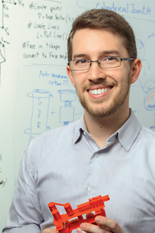Fuge Receives NSF CAREER Award
The National Science Foundation (NSF) awarded Mechanical Engineering Assistant Professor Mark Fuge a Faculty Early Career Development Program (CAREER) Award for his project, “Learning Design Representations: The Effect of Differential Geometric Manifolds on the Inference of Design Structure.” The $500K award will fund five years’ worth of work enabling Fuge to expand his research at the intersection of Engineering Design and Machine Learning, with the goal of enabling computers that learn how to design complex systems like new aircraft or vehicles. However, an aircraft is more than just its shape: a computer also has to store and use information about what it is made from, such as its metal alloys or composites, or how the complex web of electrical wiring and components connect inside the aircraft. In a computer model, each one of these aspects is represented in a different, often incompatible way. Dealing with all of these interconnected pieces at once and designing algorithms that can learn from that data is part of why systems like aircraft take so long to design and why computers have a hard time seeing the full picture of what an aircraft really is. Part of Fuge's NSF-funded research will study new machine learning algorithms that can combine these different views into one holistic picture, using new tools from advanced areas of mathematics, such as differential geometry and statistics. If successful, this approach will enable computers that can learn about how all of the pieces of something like an aircraft work together. In doing so, this can help humans design better, faster, less expensive, and more efficient systems in the future to address current technological challenges like climate change or develop new forms of energy production or transportation. For example, Fuge and his team are currently exploring similar techniques with aircraft engine manufacturers to see if these types of algorithms could enable engines that are two to four times more efficient than current engines, or to enable all-electric aircraft that reduce or eliminate dependence on fossil fuels. "Re-tooling engineers with emerging skills in artificial intelligence (AI), machine learning, and new forms of computing is critical if the United States is to continue leading the world in science and technology development," explained Fuge. "It is no secret that other nations are investing heavily in AI-related workforce development in the hopes of unseating U.S. technology leadership. The educational and research opportunities offered by this project will not only help bring our engineers up to speed in these emerging areas but will also help us push the boundary of what comes next. This way, our students and workforce can continue to lead the way as 'traditional engineering' begins to blend with these emerging 'data-driven' approaches."
Related Articles: January 29, 2020 Prev Next |


